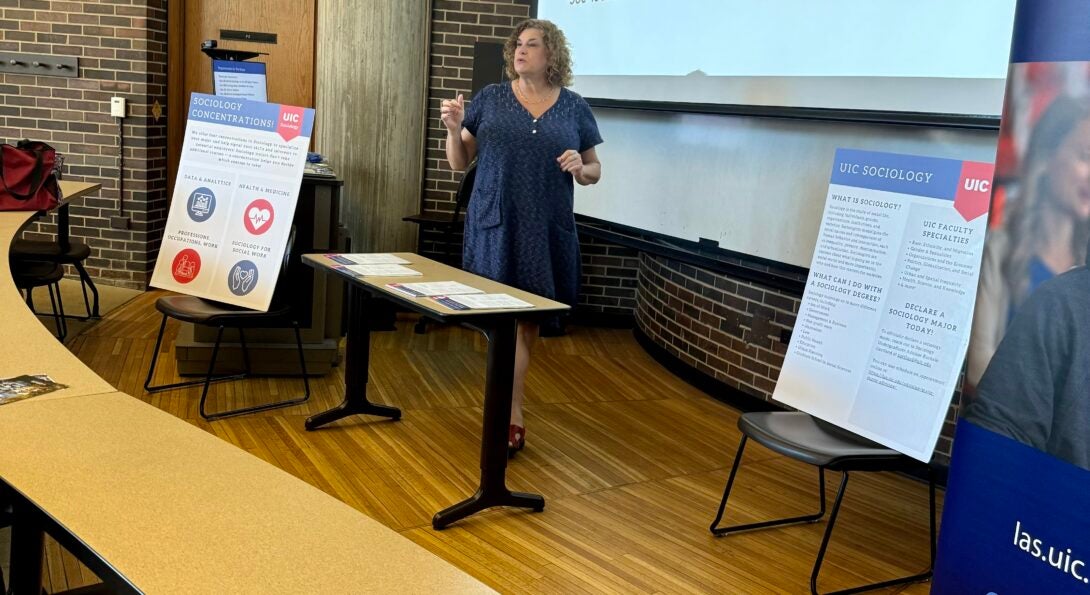Concentrations

The department offers four optional concentrations within the Major in Sociology: 1) Sociology for Social Work; 2) Health and Medicine; 3) Professions, Occupation, and Work; and 4) Data and Analytics. A sociological perspective can promote better understanding of, and help address the challenges presented by, social issues central to each concentration. To satisfy the requirements for a concentration, students should complete three courses (9 credit hours) chosen from the list approved for that concentration. These three courses replace three of the five electives required for the Major in Sociology and do not impact total credit hours needed for the major. Students who do not wish to complete a concentration should take 15 credit hours (5 courses) of SOC electives.
Concentrations
Students seeking to pursue a concentration should reach out to LAS Undergraduate Academic Advisor, Rachele Gartland via email (gartland@uic.edu) or through iAdvise.
Sociology for Social Work
Social workers often help connect individuals with social services; a background in sociology can help them understand the circumstances and context which lead to a need for these services. This concentration prepares students for future training in social work and related professions, such as counseling and education.
To satisfy the requirements for this concentration, students should complete three courses (9 credit hours) chosen from the list below.
- SOC 212 – Human Sexuality: Social Perspectives
- SOC 215 – Sociology of Childhood and Youth
- SOC 224 – Gender & Society
- SOC 225 – Racial and Ethnic Groups
- SOC 241 – Social Inequalities
- SOC 245 – Marriage and Family
- SOC 298 – Internship of Sociological Applications
- SOC 426 – Topics in Race and Gender
- SOC 440 – Topics in Organizations and Institutions
- SOC 445 – Sociology of the Family
- SOC 409 – Senior Research Practicum
- SOC 496 – Independent Study or Research
Health & Medicine
Medical and public health professionals can benefit from the sociological take on health and medicine, which uses sociological theory and research methodologies to evaluate questions related to health and the health care system, particularly regarding the relationship between health and social factors.
To satisfy the requirements for this concentration, students should complete three courses (9 credit hours) chosen from the list below.
- SOC 251 – Health and Medicine
- SOC 298 – Internship in Sociological Applications
- SOC 440 – Topics in Organizations and Institutions
- SOC 451 – Medical Sociology
- SOC 455 – Topics in Medical Sociology
- SOC 471 – Population
- SOC 409 – Senior Research Practicum
- SOC 496 – Independent Study or Research
Professions, Occupations & Work
A sociological take on work and organizations differs significantly from the approach taken in management or business-related majors, particularly regarding questions of inequality. This concentration prepares students for future training in law or other professions, or management jobs in nonprofit and for-profit companies.
To satisfy the requirements for this concentration, students should complete three courses (9 credit hours) chosen from the list below.
- SOC 244 – Sociology of Work
- SOC 298 – Internship of Sociological Applications
- SOC 426 – Topics in Race and Gender
- SOC 440 – Topics in Organizations and Institutions
- SOC 444 – Race and Gender in Organizations
- SOC 447 – Organizations
- SOC 409 – Senior Research Practicum
- SOC 496 – Independent Study or Research
Data & Analytics
This concentration focuses explicitly on the way that data affects society, and the ways that social scientists use and analyze data. A sociological take on data analysis provides students with an understanding of the contexts and people that generate big data, and how data analytics affects them.
To satisfy the requirements for this concentration, students should complete three courses (9 credit hours) chosen from the list below.
- SOC 280 – Data and Society
- SOC 285 – Data, Politics, and People
- SOC 298 – Internship in Sociological Applications
- SOC 300 – Introduction to Sociological Research
- SOC 440 – Topics in Organizations and Institutions
- SOC 471 – Population
- SOC 409 – Senior Research Practicum
- SOC 496 – Independent Study or Research